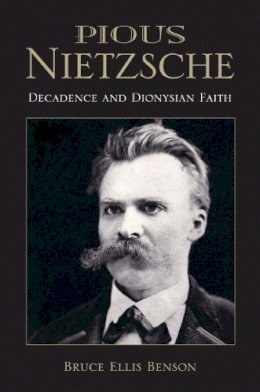6%OFF

Stock image for illustration purposes only - book cover, edition or condition may vary.
Pious Nietzsche: Decadence and Dionysian Faith
Bruce Ellis Benson
€ 26.99
€ 25.36
FREE Delivery in Ireland
Description for Pious Nietzsche: Decadence and Dionysian Faith
Paperback. A sustained and surprising reading finds Nietzsche to have been deeply religious Series: Indiana Series in the Philosophy of Religion. Num Pages: 296 pages, black & white illustrations. BIC Classification: HPCD. Category: (UP) Postgraduate, Research & Scholarly. Dimension: 236 x 158 x 21. Weight in Grams: 462.
Bruce Ellis Benson puts forward the surprising idea that Nietzsche was never a godless nihilist, but was instead deeply religious. But how does Nietzsche affirm life and faith in the midst of decadence and decay? Benson looks carefully at Nietzsche's life history and views of three decadents, Socrates, Wagner, and Paul, to come to grips with his pietistic turn. Key to this understanding is Benson's interpretation of the powerful effect that Nietzsche thinks music has on the human spirit. Benson claims that Nietzsche's improvisations at the piano were emblematic of the Dionysian or frenzied, ecstatic state he sought, but was ... Read more
Show LessProduct Details
Format
Paperback
Publication date
2007
Publisher
Indiana University Press United States
Number of pages
296
Condition
New
Series
Indiana Series in the Philosophy of Religion
Number of Pages
296
Place of Publication
Bloomington, IN, United States
ISBN
9780253218742
SKU
V9780253218742
Shipping Time
Usually ships in 7 to 11 working days
Ref
99-50
About Bruce Ellis Benson
Bruce Ellis Benson is Associate Professor and Chair of the Philosophy Department at Wheaton College, Illinois. He is author of Graven Ideologies: Nietzsche, Derrida, and Marion on Modern Idolatry and The Improvisation of Musical Dialogue: A Phenomenology of Music. He is co-editor (with Kevin Vanhoozer and James K. A. Smith) of Hermeneutics at the Crossroads (IUP, 2006).
Reviews for Pious Nietzsche: Decadence and Dionysian Faith
. . . Benson offers a decidedly new read of Nietzsche's piety, as one who . . . was deeply pious, although in a decidedly unorthodox way. . . Benson's thesis is carefully argued against the historical backdrop of Nietzsche's religious upbringing, blending together Nietzsche's early religious and musical aspirations, offering a new and convincing reading of his life and ... Read more
